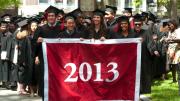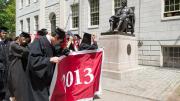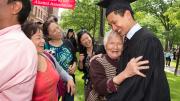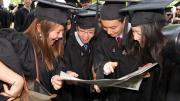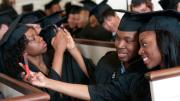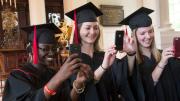“I wish for you…,” President Drew Faust told the graduating class of 2013 in her May 28 Baccalaureate address, “lives of running toward”—a theme with resonances of both a horrific external event and a famous alumna’s bestselling book (Facebook COO Sheryl Sandberg’s Leaning In).
In the aftermath of the Boston Marathon bombings, on April 15, Faust’s address to the class—which entered as the most economically diverse and the most international in Harvard history—sought to simultaneously celebrate the diversity of their achievements and to unify them in an aspiration to live fully. Live “lives in which you are motivated, even seized, by something larger than yourselves, lives of engagement and commitment and, yes, risk,” she said, “risk taken in service to what matters to you most.”
Faust recounted the class’s construction of a virtual library that will reach more than a million students in India, its participation in relief efforts to help earthquake victims in Haiti and Chile, its production of four Rhodes scholars on a single floor of Quincy House—and of course, the first NCAA victory for the men’s basketball team. She also alluded—just hours after the announcement that Evelynn Hammonds would step down from her post as dean of Harvard College—to the cheating scandal that had raised important questions about student academic integrity. “We recognize,” she said, “that winning, or the need to win or to present ourselves as winners, can at some point become a form of losing.”
“What, after all, does success mean?” she asked, noting that the Marathon bombing, and the countless examples of people who had run toward the explosion sites in order to help victims, had given such questions new context, transforming them into existential ones. “As I heard and watched and read reports of the bombings, I, like others, was struck by the way the actions of so many at the scene represented a powerful answer to such questions. Amid the calamity, there appeared streams of people running toward the chaos, toward the explosions.” These people were seized by a sense of purpose. “Not everyone is prepared to run toward an explosion,” she said. “But each of you is exquisitely suited, and urgently needed, for something.”
Faust told the class that their liberal arts education had helped prepare them to live “a life of running toward.” “Running toward,” she explained, “is a way of being, an attitude, a capacity for courage, a kind of grace, as [Massachusetts] Governor Patrick put it at the post-marathon Service—“the best of who we are.”
“The best kind of learning does not train you to win,” Faust continued. “It teaches you to ask what winning might mean. It cultivates curiosity and courage and boldness—whether you’re tracking an elusive gene or boarding a bus in Mumbai—and it gives you a new capacity to act, despite the risks.”
The president then told the story of epidemiologist Donald Hopkins, M.P.H. ’70, a Harvard School of Public Health alumnus, who was warned that he would never be able to eradicate smallpox. Years later, when he and his colleagues had succeeded in doing so, he described himself as “immunized against skepticism.”
“Live fully and live truthfully, class of 2013,” Faust concluded. “Stay in touch. Tweet. Forward us your selfies,”—self-portraits taken with portable digital cameras. “Come back now and then for a Veritaffle. And remember: Keep on busting brackets. Immunize yourself against an excess of skepticism. Immunize others. Go where you are needed. Run toward life.”
This year’s Baccalaureate ceremony marked the first in which Jonathan L. Walton, Plummer professor of Christian morals and Pusey minister in the Memorial Church, conducted the service. The ceremony has been a Harvard tradition since the seventeenth century, but now includes readings from the Analects of Confucius, the Hebrew Bible, Hindu scriptures, the Quran, and the New Testament, as well as the singing of Psalm 78 to the tune “St. Martin’s,” a tradition since at least 1806.
